BLADDR 2o24, Second session of the ongoing RENALC-BLADDR-PROSCA 2024 Hybrid Global Forum on GU Oncology, took place on 27-28 November 2024.
RENALC-BLADDR-PROSCA 2024 brought together global experts to discuss the latest advancements in renal, bladder, and prostate cancer. With a hybrid format combining both in-person and virtual sessions, the event focused on translating new research into clinical practice.
BLADDR 2024 covered key topics such as the role of artificial intelligence (AI) in diagnosing and managing non-muscle invasive bladder cancer (NMIBC) and muscle invasive bladder cancer (MIBC). The potential impact of mpMRI on patient care was also explored, alongside discussions on the use of ctDNA in the adjuvant setting for MIBC. Additionally, the conference provided updates from major congresses like ESMO, highlighting the latest research and treatment strategies. Real-world case discussions offered experts the opportunity to explore practical approaches to managing NMIBC.
RENALC 2024 took place on the afternoon of November 26, 2024. PROSCA 2024 is scheduled for November 29, 2024 (full day) and November 30, 2024 (AM).
María Natalia Gandur Quiroga is a Medical Oncologist and Chief of the Division of Genitourinary Medical Oncology at the Ángel H. Roffo Oncology Institute in Buenos Aires, Argentina. She is a Professor of Medicine at the University of Buenos Aires at the Oncologists Post Graduates Studies. Her research focuses on clinical trials with aims to improve the treatment of patients with urologic tumors. She is an active member of the European Association for Cancer Research, Argentinian Medical Association and American Society of Clinical Oncology.
María Natalia Gandur Quiroga shared her insights from RENALC24:
Translating Data into Practice: Highlights from BLADDR24
“Highlights from BLADDR24: Translating Data into Practice
Moderators: Cédric Lebâcle and Fred Witjes
Practical insights into intravesical instillation for bladder cancer:
Efficacy Tips: Limit voiding before therapy and drink fluids after.
Toxicity Risks: Hygiene matters! Men should void sitting.
Post-op timing matters for MMC—best on surgery day.
2023 Guidelines: Continuous saline irrigation recommended for chemo-ineligible.
New tools like TAR-200 & GemRIS showing promise.”
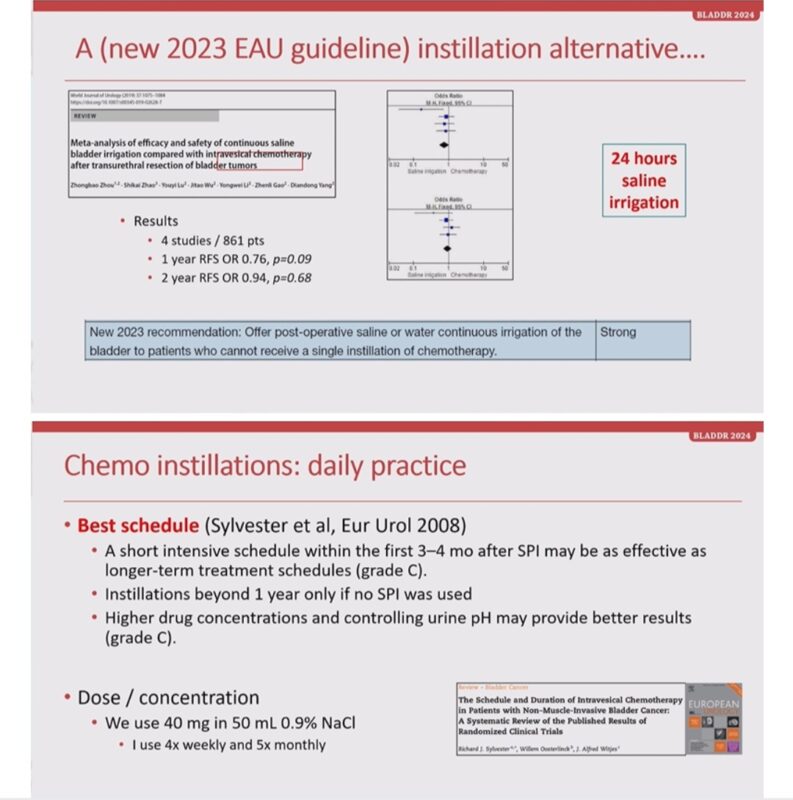
A must-watch session redefining NMIBC care pathways:
“Staging, monitoring, and response prediction: Utility or futility of novel approaches
Moderators: Ananya Choudhury, Fred Witjes
Key Presenter: Badrinath Konety
– AI Transforming NMIBC Management:
– Detection models with 96% sensitivity outperform clinicians in specific cases.
– Deep learning predicts molecular subtypes of bladder cancer, aiding tailored therapies.
– Computational histologic AI (CHAI) combines pathology and outcomes for precision in survival prediction.
– Breakthrough in BCG Response Prediction:
– Alternative regimens emerging amidst BCG shortages.
– AI predicts progression risks with enhanced accuracy, avoiding overtreatment.
– Digital Innovation in Diagnostics:
– AI-driven grading & cytology tools achieve AUCs up to 0.97, detecting nuances missed by pathologists!
– Combined clinical & histopathology models show superior recurrence prediction (AUC: 0.72).
– Future Vision: AI-integrated pathology boosts real-time decisions while improving reproducibility and reliability.
A must-watch session redefining NMIBC care pathways!”
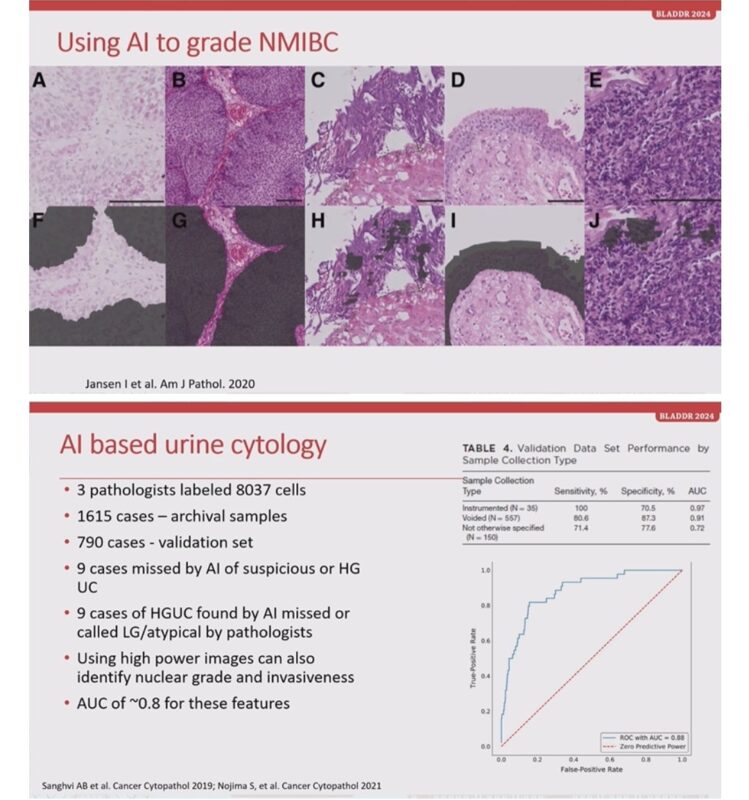
mpMRI on the Management of NMIBC and MIBC Patients:
“How can mpMRI change management of patients with NMIBC or MIBC?
Presenter: Dirk Beyersdorff
Key Insights:
– mpMRI: Superior to standard MRI/CT for staging bladder cancer.
– VI-RADS system: Standardizes mpMRI protocols for clinical & research use.
Reduce invasiveness:
– Skip diagnostic cystoscopy in VI-RADS 1 and 2 cases.
– Confirmatory biopsy (no deep TUR) for VI-RADS 5.
Challenges: Current TUR practices limit clinical relevance—pathways need reform.
Benefits: Better staging, fewer invasive procedures, and enhanced workflows!”
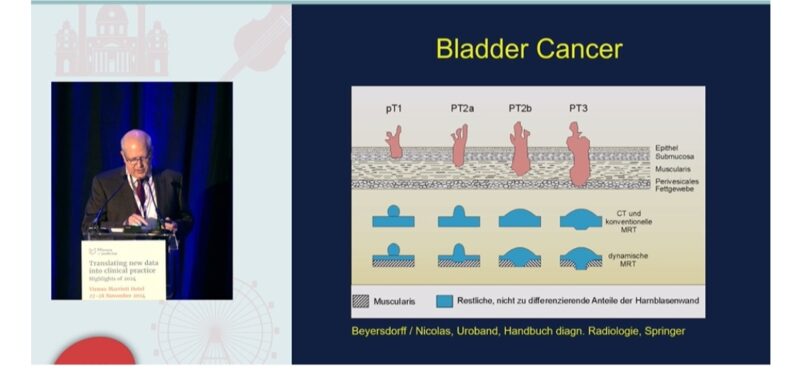
MIBC Congress Highlights – ESMO 2024
“MIBC Congress Highlights – ESMO 2024
Moderator: Renate Pichler
Presenter: Maria De Santis
– Adjuvant PEMBRO efficacy:
– Demonstrates DFS benefit in the AMBASSADOR study (HR=0.69) vs observation.
– Extended follow-up confirms outcomes.
– Phase III trials in MIBC:
– IMvigor010, CheckMate 274, and AMBASSADOR: key players in adjuvant settings.
– PEMBRO stands out with significant DFS in ITT and PD-L1+ populations.
– Challenges in Cisplatin-ineligible patients:
– SUNRISE-04: TAR-200+CET offers pCR of 42%, promising for those unfit for NAC.
– Trials like PIVOT-IO-09 and VOLGA explore innovative combinations.
– IO monotherapy in MIBC:
– Nivolumab, Atezolizumab, and Durvalumab show varying pCR rates (26-46%).
– Future directions:
– Emphasis on personalized approaches for high-risk patients.”
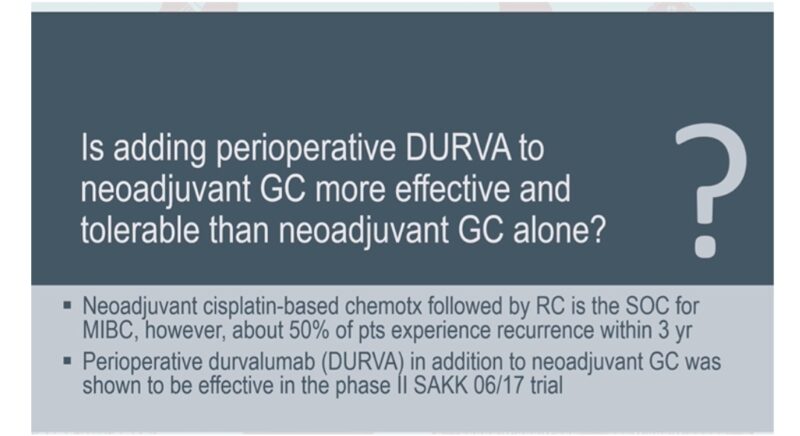
The Role of ctDNA in Adjuvant MIBC Management by petros Grivas:
“Debate: The Role of ctDNA in Adjuvant MIBC Management
Moderator: Daniele Raggie
SUPER PRESENTATION !! Petros Grivas
– ctDNA+ post-RC detected in 52% of patients; 75% had recurrence <4 months.
– Only 3% of ctDNA-negative patients developed metastases, promising for risk stratification.
– IMvigor 010: ctDNA clearance correlated with improved DFS & OS! (HR 0.59)
– TOMBOLA trial highlights: ctDNA’s predictive role needs validation—impact on NIAGARA awaited.
–Future: Serial ctDNA testing to refine prognosis but requires addressing logistical hurdles.”
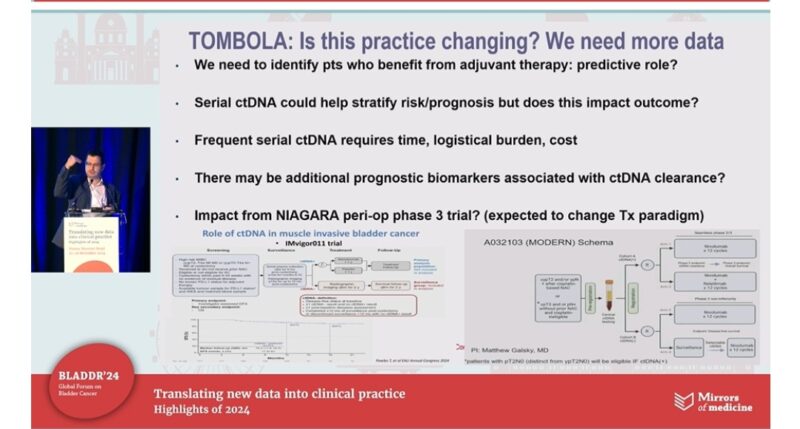
Prehabilitation Programme Highlights:
“Prehabilitation Programme Highlights: Insights from BLADDR24
Presenter: Celena Scheede-Bergdahl (virtual)
Key Points:
Exercise Prescription: 150 min/week of moderate-intensity activity. Focus on flexibility, strength, cardiovascular, and neuromotor skills.
Protein & Aging: 1.0-1.5g/kg/day protein supports muscle aging; combine with resistance training for best results.
Stress Reduction: Mental health impacts recovery. Relaxation techniques and targeted interventions are key for better outcomes.
Prehabilitation Impact: Changes physical activity behavior for the long-term, even after 12 months!
With Chemo/Radiotherapy: Use the Borg scale to adjust exercise intensity daily.
Frail/Sarcopenic Patients: Most benefit from protein + team approach to improve muscle quality.”
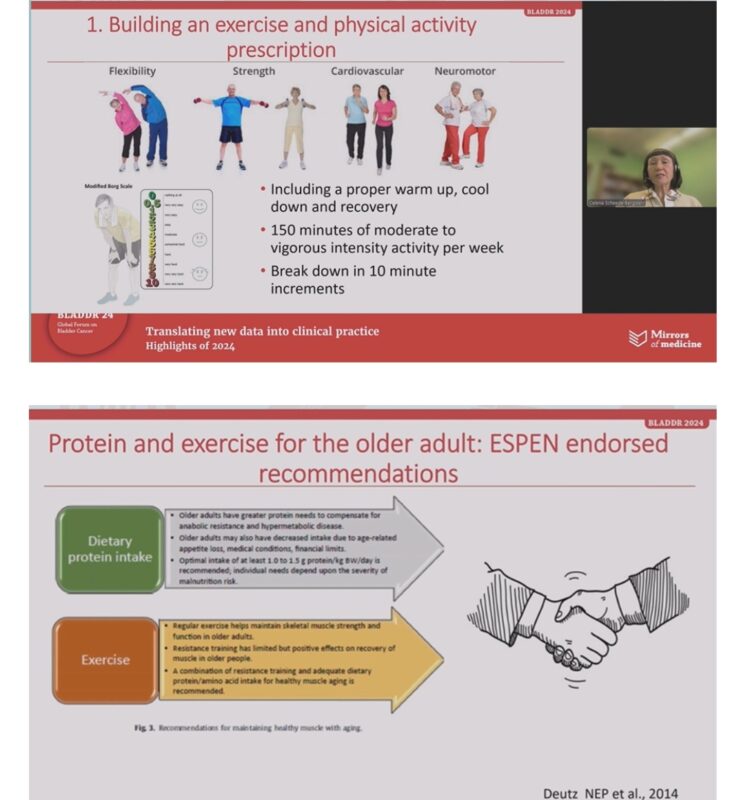
Personalized Treatments and Patient-Centric Care: An Overview by Gunhild von Amsberg:
“First-line treatment for advanced UCa: Balancing efficacy, safety, patient characteristics, and QoL
Moderator: Dora Niedersüß-Beke
Presenter: Gunhild von Amsberg
Key highlights:
– EV + P: Preferred 1L therapy for unresectable/mUC (ESMO-MCBS 4).
– Patients not eligible for EV + P:
Nivolumab + CisGem (ESMO-MCBS 2).
Up to 6 cycles of CisGem or CarboGem, followed by avelumab maintenance (for non-progressing tumors).
– Single-agent ICIs in 1L advanced disease have limited role (ESMO: I, D).
– Access to systemic therapy remains limited in Europe—urgent improvement needed!
Excellent talk emphasizing personalized treatments and patient-centric care!”
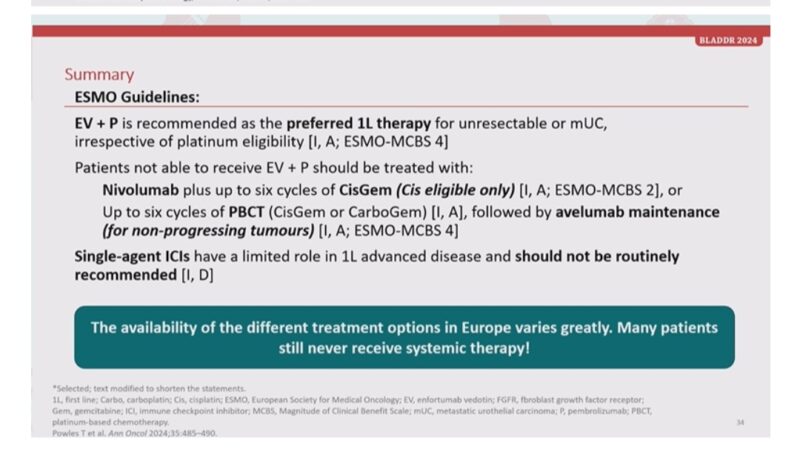
The Optimal TURBT: Key Highlights from Ben-Max de Ruiter:
“The Optimal TURBT – Key Highlights from Ben-Max de Ruiter at BLADDR24
Goal: Precise pathological staging & complete lesion removal. Use surgical checklists for quality.
Improved methods: PDD for CIS & En Bloc TURBT for tumors <3cm.
Enhanced visualization: MRI VI-RADS may soon replace re-TURBT.
Quality metrics: Bladder diagrams & detrusor sampling.
Practical, innovative, and impactful techniques reshaping bladder cancer surgery!”
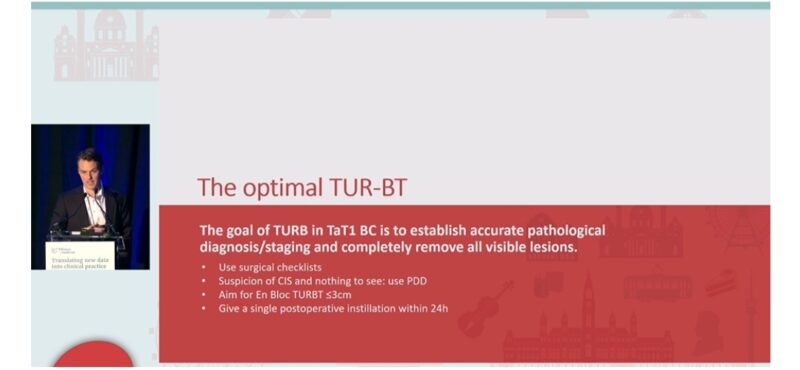
The Impact of Radical Cystectomy on Sexual Health & QoL by Pignot Géraldine:
“The impact of radical cystectomy (RC) on sexual health & QoL
Presenter: Pignot Géraldine
Moderator: Cédric Lebâcle
Key Points:
– RC impacts sexual function significantly. Yet, 41.2% of urologists avoid discussing sexual outcomes with patients.
– Gender gap: Women are underserved in sexual health post-RC, highlighting the need for PROMS to guide improvements.
– Functional recovery: Sexual-sparing strategies lead to better sexual function & urinary continence, boosting QoL.
– Multimodal management (incl. sex therapy, physical treatments) enhances post-op outcomes for both genders.
– Call to Action: Incorporate sexual outcomes as a surgical endpoint & empower patients with comprehensive pre-op counseling!”
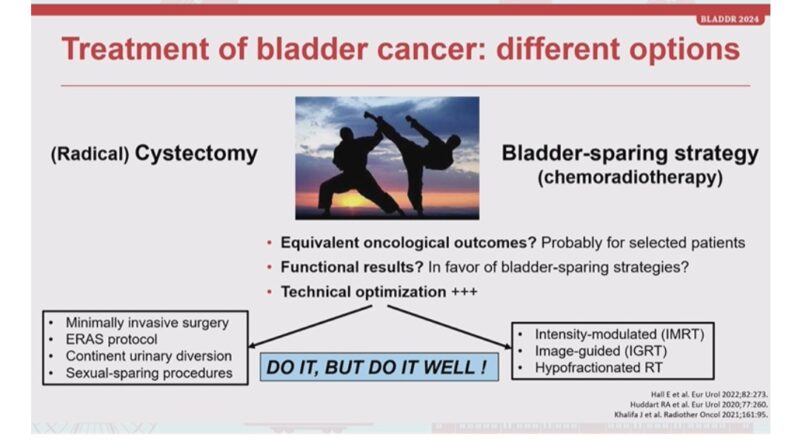
BCa management in 2025 – Insights from Kilian Gust:
“Looking ahead: BCa management in 2025 – Insights from Kilian Gust at BLADDR24!
Urologists embrace technology: device-assisted intravesical chemo enhances care. Novel intravesical therapies show promise in NMIBC—Gem/Doc & Erdafitinib leading innovation.
Perioperative clinical trials (IMvigor010, NIAGARA, CheckMate274) shape muscle-invasive strategies.
Future focus: True bladder-sparing approaches? Redefining paradigms for MIBC management. Exciting advances in uro-oncology for a brighter future!”
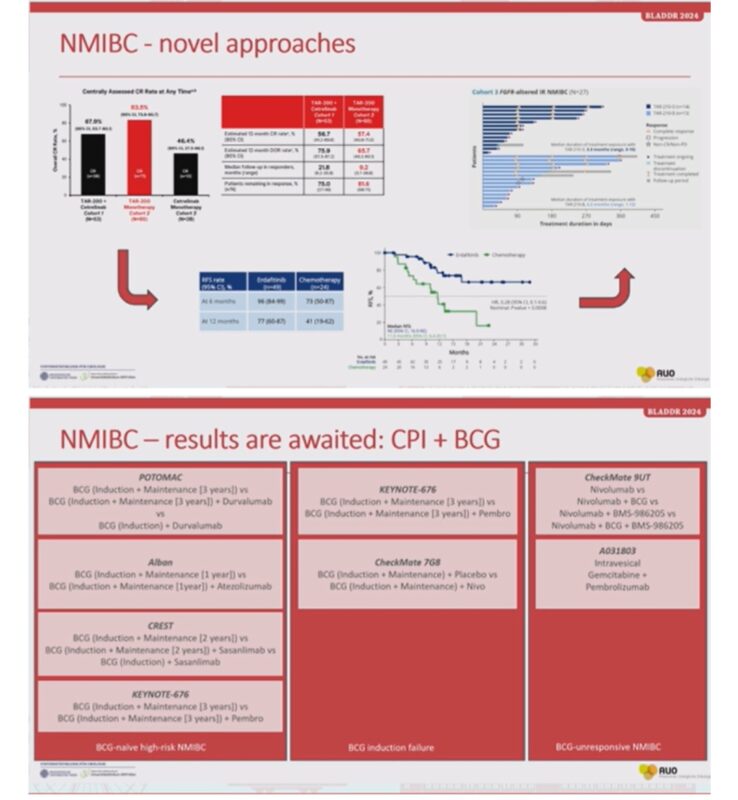
More posts featuring María Natalia Gandur Quiroga on oncodaily.com


